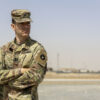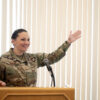University of Minnesota, Minnesota National Guard partner for crisis simulation exercise
September 11, 2016 (CANNON FALLS, Minnesota) — The Minnesota National Guard partnered with the University of Minnesota and other humanitarian organizations in a collaborative program to train students and prospective humanitarian aid workers during a three-day Humanitarian Crisis Simulation exercise at the Phillippo Scout Reservation in Cannon Falls, Sept. 9-11, 2016.
“A goal is to help students gain an appreciation of humanitarian work by putting them in an environment typical of humanitarian crises,” said Dr. Eric James, co-instructor for the course. “We put the students into complex scenarios so they can apply the knowledge and skills learned from the course. They get to experience first-hand the stress of making a decision under pressure while providing aid to refugees in an unfamiliar country.”
The Minnesota National Guard has participated in the exercise for the past four years, strengthening interagency relationships with local and international humanitarian organizations.
“We have two missions here – one is to train our own Soldiers and the other is to provide a service to our interagency partners,” said Staff Sgt. Seth Martell.
This year the Minnesota National Guard acted as the host nation security force by providing police operations, border patrol, refugee camp security and humanitarian escort operations.
“As the border patrol we made sure the students had the correct paperwork to enter the country,” said Pvt. Nic Trettel. “If the paperwork wasn’t filled out correctly, didn’t have the proper stamp, and couldn’t answer basic questions, we didn’t let them enter. We did send people back because they were missing stamps or the paperwork wasn’t filled out.”
The Minnesota National Guard reacted to a simulated militia force who harassed students and disrupted humanitarian efforts. The militia force replicated a hostile environment similar to a civil war.
“My role as the leader of the militia was to disrupt the process and try to simulate the best I can the environment that will prepare the student for what they might encounter,” said Conrad Nowak, a role player and attorney at law with Hinshaw & Culbertson. “Obviously within reason, but people may be held back, supply and demand, payoff and bribes, all those things. We have great cooperation from the Minnesota National Guard who make it realistic and give direct creditability to the exercise.”
The exercise provided interactive scenarios to University of Minnesota students who are interested in the field of humanitarian work, such as Alexandra Sevett, a public policy student at the University of Minnesota’s Humphrey School of Public Affairs.
“In general, we are getting experience talking to people who are playing their roles of refugees in camp, so it’s lots of interviewing and qualitative data and then trying to pull out information. Also, I think we are getting what it takes to be in this type of simulation, all the logistics, all the people, all the different agencies that come together is really important to experience.
This is what I’ve been studying so seeing it first-hand in the simulation is important to understand what it really takes. If you get the practical application of the things you are learning it adds to the overall learning. I’m getting good experience for me thinking about future career paths in the future.”
The exercise demonstrated teamwork between the Minnesota National Guard and prospective Humanitarian Aid Workers during a time of crisis, which is relevant for Guardsmen who respond to State and Federal disasters or humanitarian missions.
“Our troops are able to actually get the practical application of their skillset,” said Martell. “They learn how to deal with their civilian counterparts who really don’t speak the same language and they don’t really have the same focus as them. The two can work in concert, but it has to be exercised in an environment like this.”
by Sgt. Luther Talks
Minnesota National Guard Public Affairs



